The end of the year is a great moment to reflect on past achievements and lessons learnt, take stock of activities carried out and set new objectives for the year to come. It is a moment we wish to share with all of you, our Ambassadors, with a compilation of what we, Cedefop VET4Youth team and Ambassadors for tackling early leaving from VET, have achieved together. Our New Year’s resolution is to further strengthen our collaboration in 2024! Wishing everyone a restful end-of-the-year break and a Happy New Year, we renew our commitment to keep working together for quality and inclusive VET!
NEWS FROM CEDEFOP VET4YOUTH TEAM
Getting the measure of early leaving from VET in Europe
While Eurostat data measure early leaving from education and training (ELET) in Europe, it is still not possible to measure how many early leavers drop out from vocational education and training (VET). Cedefop pinpointed already in a 2016 study the main weaknesses to measure early leaving from VET (ELVET) in European countries based on available data. In 2022, Cedefop launched a new survey to its reporting network ReferNet to examine developments in EU27 (except Malta) plus Iceland and Norway in improving mechanisms and support measures to monitor and measure the phenomenon at national and regional levels. The survey findings are presented in the newly published Cedefop synthesis report Stemming the tide: tackling early leaving from vocational education and training in times of crises drafted by Irene Psifidou and Anthie Kyriakopoulou.
Read the related blog article here.

UNESCO-UNEVOC webinar on Empowering human teaching talent with digital skills
At the UNESCO-UNEVOC webinar on Empowering human teaching talent with digital skills, Cedefop expert Irene Psifidou presented different national professional development approaches, and opportunities for VET teachers and trainers (in both school- and work-based settings) to acquire and further develop their digital skills while promoting inclusion in VET. Cedefop expert Konstantinos Pouliakas focused on the impact on new digital skills requirements for the teaching profession drawing upon new empirical insights on how digitalisation impacts work in European labour markets, taken from the Cedefop second European skills and jobs survey (ESJS2).
Read our blog article to find out more about the webinar and view the webinar recording here.
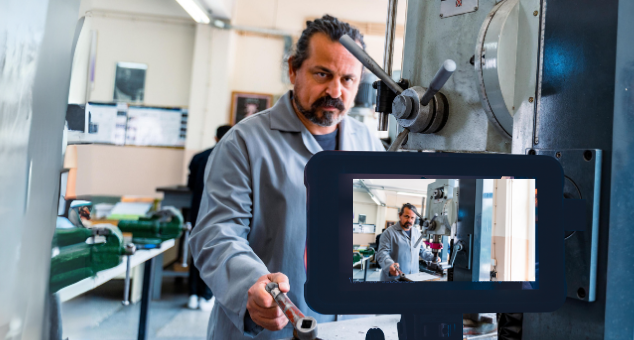
European sectoral social dialogue in education plenary meeting
Irene Psifidou participated in the European sectoral social dialogue in education plenary meeting, where she presented the main features of an upcoming Cedefop European VET teachers survey (EVTS): Supporting Teachers’ professional development in VET schools, planned to be launched in the academic year 2025-2026 with the close collaboration of participating countries as well as European social partners in education ETUCE and EFEE. This new pan-European survey is expected to bring new insights on VET teachers’ opportunities and challenges for acquiring and further developing their digital and other core and soft teaching skills. More information is available here.
Cedefop VET toolkit for tackling early leaving travels to Spain!

Dr Irene Psifidou spoke about “Towards a comprehensive education policy to tackle early leaving from education: What do other countries do?” in Fundación Bofill’s event 'Traçant camins cap al Zero Abandonament' in Barcelona, 22 September 2023. Find the video of the event here (speech in Spanish) and related newspaper articles below:
- "Espanya necessita orientació integrada en etapes primerenques" [Spain needs to integrate guidance into early stages of the education system] (interview in Catalan). El diari de l'educació.
- "España necesita una orientación integrada en el sistema que empiece en etapas tempranas" [Spain needs to integrate guidance into early stages of the education system] (interview in Spanish). El diario de la educación.
- "Hay más abandono de los estudios allí donde la educación obligatoria termina antes de los 18" [There are more dropouts of education where compulsory education finishes before 18 years old] (interview in Spanish). Diari ARA.
Counting everybody in – As inclusive as it gets and skilfully digital
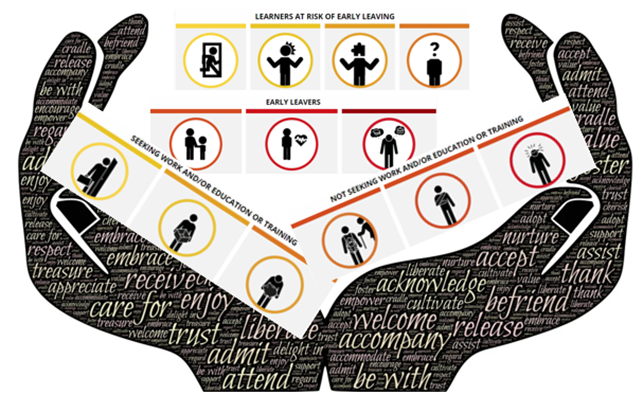
Anthie Kyriakopoulou presented the work of Cedefop’s ‘VET4Youth – Teachers and trainers’ team at the national consortium meeting of ReferNet Czechia. She focused on the continuing professional development (CPD) opportunities offered to VET teachers in European countries on inclusion, digital and green skills.
University meets society in Rethymno, Greece
Anthie Kyriakopoulou presented possibilities and challenges in education in the digital era drawing from Cedefop VET toolkit’s intervention approaches on digital inclusion and inclusive teaching, at an event co-organised by the University of Crete and local authorities of Rethymno, which took place on 23/10 at the House of Culture in the charming city of Rethymno. The event was part of an initiative aiming at bringing together university and society, by raising awareness and encouraging debate among invited experts and the general public on selected topics of current interest. A press release and more information about the event are available here (in Greek).
Towards more inclusive vocational education and training (VET)
Anthie Kyriakopoulou believes that a learner-centred approach can be an effective way to support the reintegration of early school leavers and NEETs (‘not in employment, education or training’). Ensuring that VET educators have the right skills to do so is the key. Many early leavers and NEETs have experienced underachievement in the past, undermining their trust in their own abilities or in education. To rebuild this trust, teachers need a set of teaching and transversal skills, such as communication and active listening, psychosocial support, managing diversity, digital and green skills. Read the full article here.
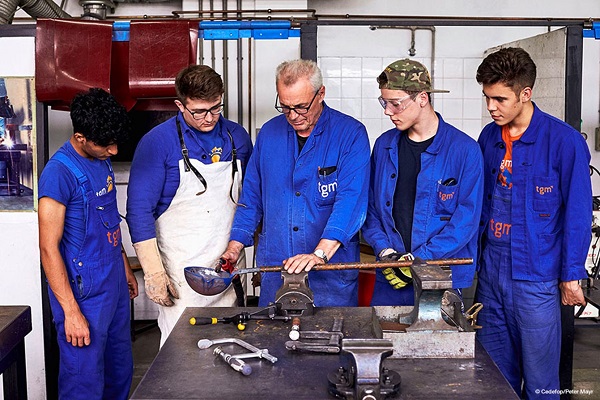
Invitation to Cedefop’s Virtual get-together on Greening VET
Cedefop is organising its 7th Virtual get-together on “Greening VET: What does it mean and what does it take?”, on Thursday 25 January, 14:00-15:30 CET.
The event will bring together stakeholders from various aspects of vocational education and training (VET) to explore the ways that “greening” has already affected the content and delivery of VET curricula and programmes; and what future steps are necessary for VET to support the achievement of “green” EU policies. Inspiring practices will also be illustrated.
The role of “green” skills anticipation, apprenticeships, update of VET curricula and programmes and Microcredentials will be discussed during the panel.
You are warmly invited to register to the event here!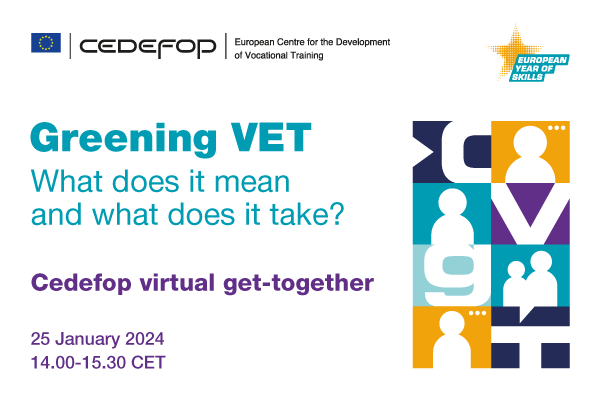
NEWS FROM THE AMBASSADORS

Our Ambassador from Spain Christian Esteva presented to the Ambassadors tackling early leaving from VET the Follow-us project toolkit during a webinar on 15 September 2023. This toolkit is aimed at training NEETs to become Social Media Managers by developing an onsite course but also by training the Socio Inclusion workers and teachers, that are in contact with NEETs in the subject of Social Media. During the session the three outputs of the toolkit (Course for NEETs, Course for Trainers and Platform) were presented and the Ambassadors were invited to test and evaluate the tools. See the presentation here.
At the same event, Rena Psifidou and Anthie Kyriakopoulou presented Cedefop’s VET toolkit for empowering NEETs to the Ambassadors. Their presentation is available here.
Our Ambassador from Czechia Martin Majcík is co-author of the report Life pathways of repeatedly unsuccessful secondary school examinees, and member of the team that conducted the relevant research. The report was produced within the context of research conducted by Masaryk University (Department of Educational Sciences). It presents original results about failing students during exit exams and their risk of leaving from the educational system. Read the full report here.
Our Ambassador from Portugal Ana Ribeiro is involved in Erasmus+ Project 2020-1-PT01-KA202-078758 – Learning Through Game Playing – Habilitas. This project was initiated at the beginning of COVID-19 pandemic when in all countries, it was felt there was a lack of qualified staff in the care sector. At the same time, the VET school partners involved in the project partnership had/have learners with Special Needs or learning difficulties/disabilities that did not fit in the formal learning approach and who also needed to be prepared to integrate into the labour market and see their needs met. Working with elderly people demands not only qualified people but especially caring and dedicated staff. This partnership was willing to help this target group integrate successfully into the labour market, enhancing their competences and skills and making them able to answer the needs of Day/Elderly Centres.
Our Ambassador Valentina Chanina, Secretary General of EfVET, informed us about MAKE IT HAPPEN, implemented by EfVET together with 8 European partners. The project aims to support mobility operators to enlarge their actions to VET learners with disabilities. One of the concrete results of the project is the Catalogue of Inspiring Practices on Inclusive mobilities.
Further, EfVET included on its Strategic Plan 2022-2026 the Strategic Direction (SD) 5 “Promoters of work-based learning”, which plans to implement a wide range of measures and initiatives aimed to contribute to and actively support the developments in work-based learning. Part of these initiatives is EfVET WBL Guideline, a toolkit developed by SD5 Working Group under FUSION project (number 101121773), with contributions from EfVET Members. EfVET WBL Guideline is available for download here.
Our Ambassador from Romania Larisa Ile informed that World Tourism Day and the European Year of Vocational Skills were the main themes of the conference "Bridge the gaps! Skills for a new tourism ecosystem" organised by the Association of Teachers and Mentors in Tourism "Edu4Tourism", FIHR - Federation of the Hotel Industry in Romania and Romanian-American University, Faculty of Tourism and Hospitality Management on 27 September 2023. During the conference, workshops were organised for teachers about green skills applied in the tourism industry. Hotel managers and travel agencies were invited to address sustainability topics in hospitality, spa tourism and cruise industry. A space named “pitch the idea – the student voice” was allocated for VET students who were presented their own business ideas to practice entrepreneurial and communication skills in real context.
Our Ambassador from Spain Inma Vitaller shared a policy brief developed by OECD about Spain’s Action Plan to tackle early leaving from education and training (ELET) which introduces 44 recommendations. Read the full article here.
MEET OUR NEW MEMBERS

Sotiria Tsalamani, an EU Project Manager at EVBB, the European Association of Institutes for Vocational Training, brings her experience in managing educational projects in the non-profit and private sectors, showcasing a deep commitment to advancing vocational education initiatives.

Antonio Gennarelli is EU Project Manager at the EVBB - the European Association of Institutes for Vocational Training. His interests include international cooperation, in particular with third countries. He has been working as project manager and fundraiser in Italy, Greece and now Belgium, and he speaks Italian, English, French, Greek and Japanese.

Dr Larisa Ile is a VET teacher, tourism specialisation, in a professional high school form Bucharest. Together with a group of VET teachers, she founded the Association of Tourism Teachers and Mentors “Edu4Tourism” to create a permanent partnership between teachers and the employees of the practice partner companies of vocational schools in order to improve the image of vocational education and increase interest in practicing professions in the field. She also has experience in tourism and hospitality management and is interested in the field of research related to the theory of medical and health tourism (her Phd thesis).
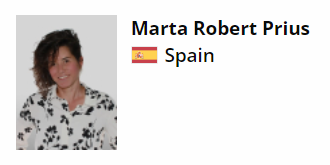
With a solid background in Educational Neuropsychology and Neurotechnology, Marta has led educational programmes, designed pedagogical projects focused on Early School Dropout on the Prevention of Early School Leaving, Digital Literacy and currently cybersecurity education. Marta firmly believes in the potential of our future generations, which is why, for more than 10 years, she has been sharing projects with them, seeking to develop their skills and helping them to become expert apprentices.
LATEST RESOURCES UPLOADED ON CEDEFOP’S VET TOOLKIT FOR TACKLING EARLY LEAVING AND VET TOOLKIT FOR EMPOWERING NEETS
New good practices and tools
DIG.I.T.ABLE – Digital Inclusive Trainers for Accessible Education
The project intends to define a teaching paradigm for inclusive digital trainers in vocational education and training (VET), transferring to participants innovative teaching approaches, engagement strategies and user-friendly tools for the development of learner-centred inclusive digital training. Inclusive and accessible VET programmes can help people with sensory disabilities, increasing their participation in the labour market; at the same time, they can improve the skills of professional trainers and expand their job opportunities.
Work-based learning Programme for dropouts – Liceo del Lavoro
The work-based learning programme for dropouts is an inclusive excellence model for reducing early school leaving. This model fosters the recovery of young dropouts by promoting their integral human development. It requires:
- a strongly work-based-oriented learning method;
- coaching aiming at a supported transition to work;
- social-emotional learning through a tutoring service.
STEP 3 – Smart Training Education Education Platform
Based on DigComp 2.0 methodology, the STEP 3 online course consists of key components of digital competence within five areas - including: 1) information and data literacy, 2) communication and collaboration, 3) digital content creation, 4) safety, and 5) problem solving. It offers a wide range of resources that are accessible to everyone and can be used to develop digital skills. The platform is a valuable resource for both teachers and learners, offering a variety of useful e-tools and applications in the format of video instruction.
SHOW-VET – Smooth Hybrid and Online Working for VET
SHOW-VET aims to provide VET for all people smoothly and ecologically regardless of their residency or challenging life situation.
DROP IN - EDUC’ACTION – A catalogue on non-formal education methods
Educ’Action: Education in Action! A catalogue of 40 non-formal education techniques that can be used by teachers in classes. The catalogue presents the activities, indicating the objectives, the duration and number of participants, the materials to be used, the results to be obtained and the methods of evaluation.
Schools for All – Integration of Refugee Children in Greek Schools, submitted by our Ambassador from Greece Dora Katsamori
Schools for All project aims to strengthen the democratic and inclusive culture in schools, targeting schools with reception classes. It offers training and support to the school community (heads, teachers, parents, students) on issues related to democratic citizenship, inclusion and human rights.
CREUS – Creative, non-formal learning in unconventional spaces
CREUS provided a new approach focusing on learning in ‘unconventional spaces’ to support the transversal skills of disadvantaged and unemployed young people (aged 16–24 years) to foster access to initial VET and labour markets.
Acceder Programme for the employment of Roma – Programa Acceder para el empleo de la población gitana
Acceder, the training and employment programme of the Fundación Secretariado Gitano (FSG), aims to promote access of Roma population to the labour market, particularly through salaried employment, as a gateway to social inclusion.
Giovanisì – The Tuscany Region’s project for the autonomy of young people
The main objective of Giovanisì is to foster the transition process of young people towards autonomy, thanks to a system of opportunities structured in seven areas: internships, housing, civil service, doing business, work, study, training and Giovanisì+ (participation, culture, legality, social issues and sport).
NEETs for NEETs – Co-creating social sustainability
While the numbers of young people Not in Employment, Education or Training (NEETs) are still staggering, it is not always easy to find an effective solution to reverse this trend. The NEETs for NEETs project seeks to respond to this issue together with youth affected by such problems, rather than once again providing the answers from a top-down perspective. In this regard, the project aims to improve and co-create together with NEETs sustainable and inclusive methods to empower young NEETs and improve their conditions.
New publications
Stemming the tide: tackling early leaving from vocational education and training in times of crises
Synthesis report of Cedefop/ReferNet survey
This synthesis report, based on a survey carried out during 2022 with Cedefop’s reporting network ReferNet, aims to provide a better understanding of the phenomenon of early leaving from vocational education and training (ELVET). Such understanding is a necessary precondition for designing effective responses to help individuals to equip themselves with the appropriate skills to cope with future transformations and to thrive in life.
Assessing learners' competences: policies and practices to support successful and inclusive education
European Education Area Strategic Framework - Working Group on Schools, sub-group Pathways to School Success
The report provides guidance on how to improve and make classroom-based assessment more inclusive and better integrated. It is one of the key outcomes of the European Education Area Working Group on Schools.
Lifelong guidance for persons with disabilities
Cedefop Briefing note
Cedefop, together with its CareersNet partners in EU Member States and beyond, has collected examples of lifelong guidance policies and practices that support the rights and opportunities of people with disabilities. This briefing note showcases some of these initiatives in EU Member States and beyond, and presents policy pointers for further action.
Early warning systems for students at risk of dropping out - Policy and practice pointers for enrolling all children and adolescents in school and preventing dropout
UNICEF Series on Education Participation and Dropout Prevention - Volume 2
UNICEF helps countries and education professionals improve their strategies to prevent school dropout. Building on the Education Participation Series, this brief on Early Warning Systems for students at risk of dropping out aims to guide education decision-makers and schools on dropout prevention.
Blended learning for inclusion
European Commission
In 2021, education ministers in the EU adopted a Council Recommendation on blended learning approaches for high-quality and inclusive primary and secondary education, supported by a handbook. ‘Blended learning’ in formal education and training can be a blend of: school site and other physical learning environments (companies, training centres, distance learning, outdoor, cultural sites, etc.) or blending different digital and non-digital learning tools.
Learning, teaching and policy making in VET - Emerging issues in research on vocational education and training, vol. 8
Lázaro Moreno Herrera, Marianne Teräs, Petros Gougoulakis & Janne Kontio (eds.)
This is the eighth volume in the research book series Emerging Issues in Research on Vocational Education & Training. The series is published by the research group VETYL (Vocational Education and Training/Yrkeskunnande och Lärande), at the Department of Education, Stockholm University, Sweden.
